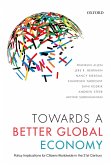As Ghana approaches its 60th birthday, optimism and worries for the future continue to be present in equal measure. Economic growth in the last decade has been high by historical standards. Indeed, recent rebasing of GDP figures has put Ghana over the per capita income threshold into Middle Income Country status. However, structural transformation has lagged behind. Fiscal discipline has also eroded significantly and there is heavy borrowing, especially on the commercial market, while elements of the natural resource curse from oil have already occurred. The question most observers ask is whether the gains from two decades of reforms are being reversed. Given this background, this volume brings together leading established and young economists, from within and outside Ghana, to analyze and assess the challenges facing Ghana's economy as it enters its seventh decade and the nation heads towards three quarters of a century of independence. The chapters cover the major macroeconomic and sectoral issues, including fiscal and monetary policy, trade and industrialization, agriculture and infrastructure. The volume also covers a full range of social issues including poverty and inequality, education, health, gender, and social protection. The book also examines the implications of the oil boom for Ghanaian development, and the role of institutions.
Dieser Download kann aus rechtlichen Gründen nur mit Rechnungsadresse in A, B, BG, CY, CZ, D, DK, EW, E, FIN, F, GR, HR, H, IRL, I, LT, L, LR, M, NL, PL, P, R, S, SLO, SK ausgeliefert werden.









